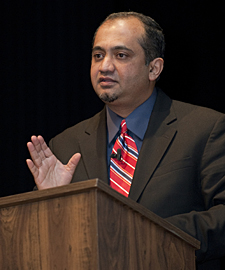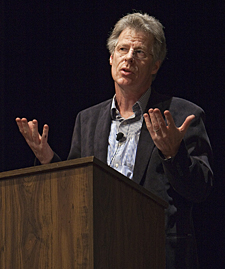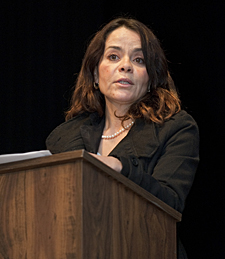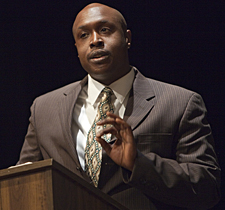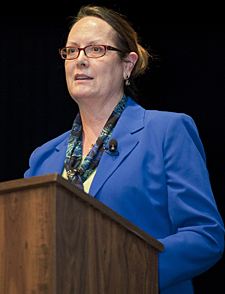
ADVERTISEMENT
- Rozovsky wins prestigious NSF Early Career Award
- UD students meet alumni, experience 'closing bell' at NYSE
- Newark Police seek assistance in identifying suspects in robbery
- Rivlin says bipartisan budget action, stronger budget rules key to reversing debt
- Stink bugs shouldn't pose problem until late summer
- Gao to honor Placido Domingo in Washington performance
- Adopt-A-Highway project keeps Lewes road clean
- WVUD's Radiothon fundraiser runs April 1-10
- W.D. Snodgrass Symposium to honor Pulitzer winner
- New guide helps cancer patients manage symptoms
- UD in the News, March 25, 2011
- For the Record, March 25, 2011
- Public opinion expert discusses world views of U.S. in Global Agenda series
- Congressional delegation, dean laud Center for Community Research and Service program
- Center for Political Communication sets symposium on politics, entertainment
- Students work to raise funds, awareness of domestic violence
- Equestrian team wins regional championship in Western riding
- Markell, Harker stress importance of agriculture to Delaware's economy
- Carol A. Ammon MBA Case Competition winners announced
- Prof presents blood-clotting studies at Gordon Research Conference
- Sexual Assault Awareness Month events, programs announced
- Stay connected with Sea Grant, CEOE e-newsletter
- A message to UD regarding the tragedy in Japan
- More News >>
- March 31-May 14: REP stages Neil Simon's 'The Good Doctor'
- April 2: Newark plans annual 'wine and dine'
- April 5: Expert perspective on U.S. health care
- April 5: Comedian Ace Guillen to visit Scrounge
- April 6, May 4: School of Nursing sponsors research lecture series
- April 6-May 4: Confucius Institute presents Chinese Film Series on Wednesdays
- April 6: IPCC's Pachauri to discuss sustainable development in DENIN Dialogue Series
- April 7: 'WVUDstock' radiothon concert announced
- April 8: English Language Institute presents 'Arts in Translation'
- April 9: Green and Healthy Living Expo planned at The Bob
- April 9: Center for Political Communication to host Onion editor
- April 10: Alumni Easter Egg-stravaganza planned
- April 11: CDS session to focus on visual assistive technologies
- April 12: T.J. Stiles to speak at UDLA annual dinner
- April 15, 16: Annual UD push lawnmower tune-up scheduled
- April 15, 16: Master Players series presents iMusic 4, China Magpie
- April 15, 16: Delaware Symphony, UD chorus to perform Mahler work
- April 18: Former NFL Coach Bill Cowher featured in UD Speaks
- April 21-24: Sesame Street Live brings Elmo and friends to The Bob
- April 30: Save the date for Ag Day 2011 at UD
- April 30: Symposium to consider 'Frontiers at the Chemistry-Biology Interface'
- April 30-May 1: Relay for Life set at Delaware Field House
- May 4: Delaware Membrane Protein Symposium announced
- May 5: Northwestern University's Leon Keer to deliver Kerr lecture
- May 7: Women's volleyball team to host second annual Spring Fling
- Through May 3: SPPA announces speakers for 10th annual lecture series
- Through May 4: Global Agenda sees U.S. through others' eyes; World Bank president to speak
- Through May 4: 'Research on Race, Ethnicity, Culture' topic of series
- Through May 9: Black American Studies announces lecture series
- Through May 11: 'Challenges in Jewish Culture' lecture series announced
- Through May 11: Area Studies research featured in speaker series
- Through June 5: 'Andy Warhol: Behind the Camera' on view in Old College Gallery
- Through July 15: 'Bodyscapes' on view at Mechanical Hall Gallery
- More What's Happening >>
- UD calendar >>
- Middle States evaluation team on campus April 5
- Phipps named HR Liaison of the Quarter
- Senior wins iPad for participating in assessment study
- April 19: Procurement Services schedules information sessions
- UD Bookstore announces spring break hours
- HealthyU Wellness Program encourages employees to 'Step into Spring'
- April 8-29: Faculty roundtable series considers student engagement
- GRE is changing; learn more at April 15 info session
- April 30: UD Evening with Blue Rocks set for employees
- Morris Library to be open 24/7 during final exams
- More Campus FYI >>
2:44 p.m., Feb. 16, 2011----Muqtedar Khan believes that Hosni Mubarak's stepping down as Egypt's president will be remembered as a “where were you when” event in history.
When Khan learned the news while being interviewed on the radio on Feb. 11, he said he wrote on Facebook: “The pharaoh has drowned, let democracy sail.” Khan referred to the protests in Egypt and Mubarak's ensuing resignation as “an awakening of the Arab nation -- a rebirth.” If Egypt becomes a democracy, he said, democracy will occur throughout the Arab world.
Khan, associate professor of political science and international relations, was on a panel of University of Delaware faculty and students who shared their views of the historic events in Tunisia and Egypt with some 150 attendees, mostly UD students and faculty, Feb. 15, in Pearson Hall auditorium.
While Khan is “filled with excitement” about the ending of Egypt's totalitarian regime, Rudi Matthee, Unidel Professor of History, is looking ahead more cautiously.
“We are witnessing an extraordinary movement in the history of the Middle East,” Matthee said. “Egyptians have never been treated as more than mules by their rulers. Now Egyptians are reclaiming their humanity.”
However, “there is no quick or easy road to democracy,” Matthee said. “The economy will have the last word,” he noted, pointing out that Egypt's sources of income are mostly “externally determined,” including tourism, the Suez Canal, and foreign aid.
Ikram Masmoudi, assistant professor of Arabic language and culture, spoke of the Tunisia uprising, which went “almost unnoticed by the American media,” but set off protests in Egypt through the power of social media.
“The Tunisia uprising was the triumph of the individual over the ideological,” she said.
When a frustrated 26-year-old Tunisian, Mohamed Bouazizi, who had a university degree but could find no work, was stopped for selling produce on the street without a license, he set himself on fire.
“We witnessed a difference in pattern from the suicide bomber who kills himself and others, and he who kills himself in protest against ethnic abuse, tyranny and humiliation,” Masmoudi noted.
Yasser Arafat Payne, assistant professor of Black American Studies (BAMS), who directed the recent BAMS Study Abroad Program, spoke of his group's experiences in Cairo as the protests began.
It was his first study abroad trip, his first time in Egypt, and only his second time out of the country.
He and his 10 students witnessed the chaos under a communications black-out.
“We hugged each other a lot to keep our spirits up,” he said. “In many respects, we were, in fact, a family.”
Thus, Payne said, his group came to learn the focus of the study-abroad -- the ancient Egyptian concept of “Ma'at,” which stands for balance, order, peace and righteousness.
Audrey Helfman, associate professor in the School of Public Policy and Administration who directed the LEAD study-abroad trip to Egypt and Morocco, reminded the audience that “leaders need to listen to their people. People need an opportunity to present their voices.”
Then she read some of the emails she's received from Middle East Partnership Initiative (MEPI) students. Since the first MEPI program at UD in 2004, the campus has welcomed more than 120 students from the Middle East and North Africa for six weeks of academic and community service activities.
“People are starting to feel this is their own country,” Sarah, an Egyptian student, wrote in the aftermath of the tumult.
Julio Carrión, associate professor of political science and international relations and director of area studies, moderated the panel. The event was sponsored by the Office of the Provost, the Institute for Global Studies, and the Area Studies and Islamic Studies programs.
Article by Tracey Bryant
Photos by Evan Krape



